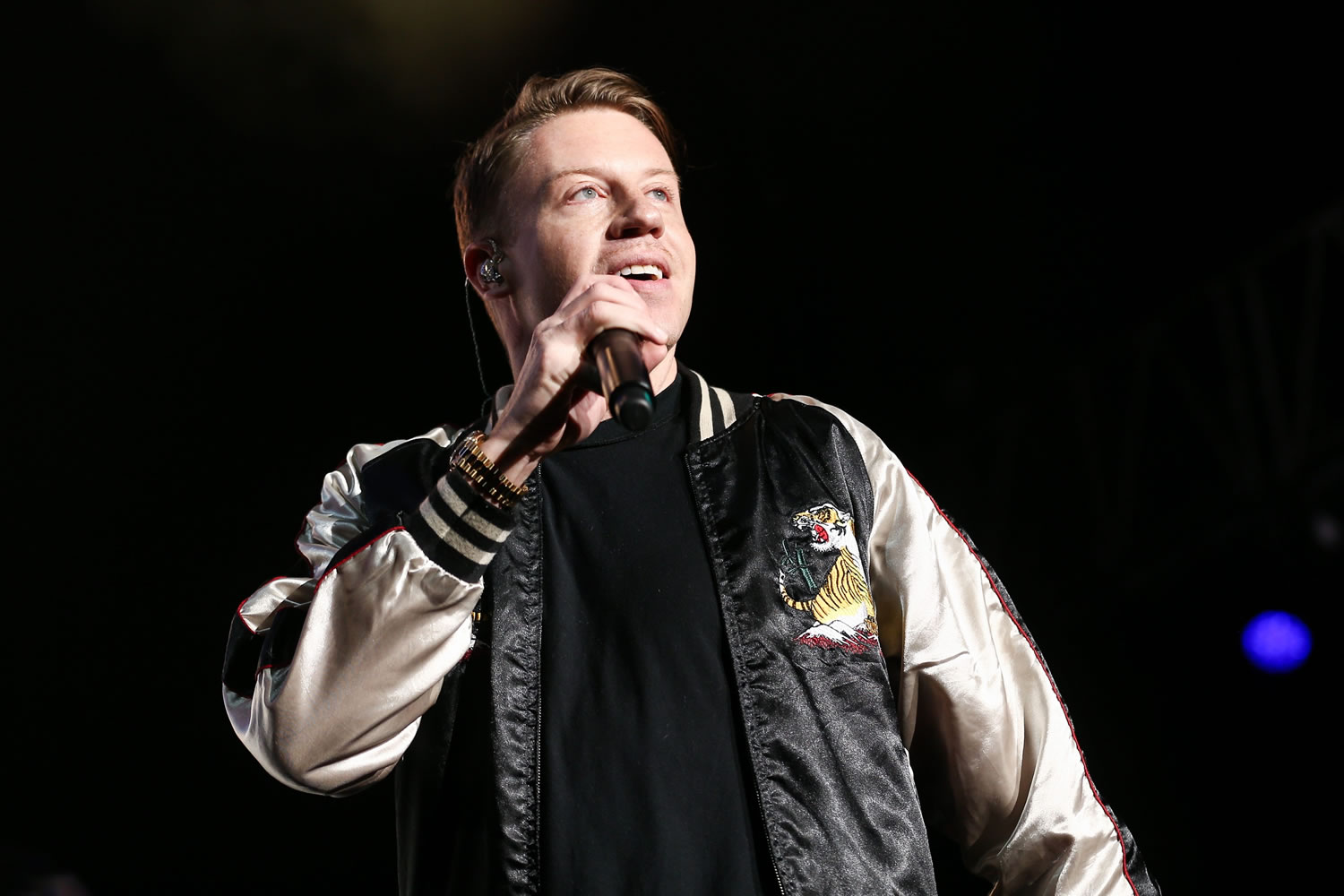Two years ago, Macklemore was apologizing for his success. Going up against the likes of established favorites Jay Z, Kanye West, Drake and Kendrick Lamar at the 2014 Grammys, he bested them all, taking home awards for best new artist, best rap song, best rap performance and the coveted best rap album.
As with today’s #OscarsSoWhite backlash, it didn’t go unnoticed that the “whitest” nominee, a lanky newcomer from Seattle, had taken home the crown with songs that some thought were too simplistic. His biggest hits touched upon thrift stores and realizing that he wasn’t gay even though he could draw; The Washington Post’s music critic, Chris Richards, has described Macklemore as “an affable white rapper of limited dimension.”
So glaring was the Grammys sweep that Macklemore (whose real name is Ben Haggerty) felt compelled to address it, via a screenshot of a text he sent to Kendrick Lamar. “You got robbed,” Macklemore wrote. “I wanted you to win. … It’s weird and sucks that I robbed you.”
This gesture prompted condemnations of its own. Commentators wondered: If Macklemore was so sincere about his respect for Lamar — and his regret over beating him — why did he seem intent on publicizing his humility? While Lamar responded by calling Macklemore a “genuine dude” whose success was “well-deserved,” fellow nominee Drake forgot his Canadian manners for a moment and said the apology was “wack.”
“This is how the world works,” Drake told Rolling Stone. “He made a brand of music that appealed to more people than me, Jay Z, Kanye and Kendrick. Whether people wanna say it’s racial, or whether it’s just the fact that he tapped into something we can’t tap into, that’s just how the cards fall.”
With his latest single, Macklemore is now saying it’s racial.
In the track “White Privilege II,” released last week, the rapper and DJ Ryan Lewis grapple with all of the criticism that has been aimed the rapper’s way, along with some of the damning reasons for his appeal. Collaborators on the song include a slate of artists of color, including vocalist Jamila Woods to spoken word poet Hollis Wong-Wear, whose bios on the release site reflect on their own journeys toward coming to terms with their racial identity.
“White Privilege II” intersperses audio of a Black Lives Matter protest with Macklemore’s lines of self-questioning. He says he feels alienated by the movement because he is unsure about whether he has the right to participate, but then he ponders how he and other white artists have appropriated black culture, such as hip-hop, for personal gain while staying silent on the inequities that African Americans face.
“We take all we want from black culture, / but will we show up for black lives?” Macklemore raps. “The DIY underdog, so independent/ But the one thing the American dream fails to mention/ is I was many steps ahead to begin with.”
One verse layers the voices of hypothetical fans commending Macklemore on his music, including one “old mom” who tells him she likes his work “cause it’s positive. It’s the only hip-hop that I let my kids listen to. Cause you get it, all that negative stuff — it isn’t cool. … Even the protest outside, so sad, and so dumb. If a cop pulls you over, it’s your fault if you run.”
Macklemore also calls out other white artists for piggy-backing on the success of blacks: “The culture was never yours to make better / You’re Miley. You’re Elvis. You’re Iggy Azalea.”
Azalea, the Australian-born rapper who has been scrutinized for adopting an imitation “blaccent,” wrote a displeased tweet reacting to the mention but did not engage with the issue.
Elsewhere, “White Privilege II” has by turns been commended and criticized. On the one hand, it appears to be a sincere effort by a famous white rapper to be self-aware about how race has factored into his achievements. On the other hand, it’s possible to read the song as another Grammys apology text: a public admission of guilt that takes attention away from the people Macklemore is supposedly supporting.
DeRay Mckesson, a prominent Black Lives Matter activist, tweeted that he had a long conversation with Macklemore about the song and appreciated his efforts:
“I left the call with Macklemore w/ a deeper understanding of his intent and his commitment to actions that reflect his awareness.”
He also tweeted, “And Macklemore’s song is not above critique, he knows this. It should be critically engaged. All art should be critically engaged.”
Cori Murray, entertainment director of Essence magazine, likewise told the Associated Press: “I think that he really did just say very plainly … ‘I know I’m appropriating black culture, but I’m trying to do it in the most authentic way.’ ”
Others couldn’t help but point out a few ironies. Karl Shannon tweeted, “MACKLEMORE WILL BE PRAISED FOR HIS WHITE PRIVILEGE SONG, BUT BLACK ARTISTS WHO RAP ABOUT THEIR FIRST-PERSON STRUGGLES ARENT”
The song is a sequel of sorts to Macklemore’s 2005 “White Privilege.” The release site for the second installment describes “White Privilege II” as “the outcome of an ongoing dialogue with musicians, activists and teachers within our community in Seattle and beyond.”



